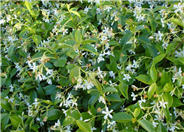
Common name:Star Jasmine, Maile Haole
Botanical name:Trachelospermum jasminoides
The Star Jasmine is an evergreen vine that grows 20' tall or as a groundcover that reaches 1'-2' tall and 4'-5' wide. It has white fragrant flowers in the summer and can tolerate sun or partial shade. The Star Jasmine is also drought tolerant. -Cornflower Farms
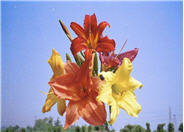
Common name:Hybrid Daylily (various)
Botanical name:Hemerocallis hybrids
These summer-blooming perennials form clumps with large, grass-like leaves. Its showy flowers, resembling lilies, are borne in clusters on stems held well above the foliage. They prefer full sun to light shade, well draining soil that is slightly acidic and rich. They do better with deep watering once a week. Daylilies make excellent cut flowers. Apply a layer of compost every fall.
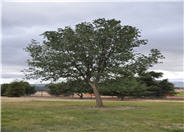
Common name:California Black Oak
Botanical name:Quercus kelloggii
The California Black Oak is a deciduous tree that grows 20'-60' tall. It has sharply lobed leaves which turn yellow to orange in the fall. The Black Oak is a California native, is drought tolerant, and attracts butterflies. -Cornflower Farms
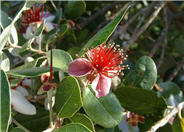
Common name:Pineapple Guava, Feijoa
Botanical name:Acca sellowiana
Classified as an evergreen shrub or a small tree, this plant can be pruned to almost any size or shape. Its foliage is gray green and silvery underneath. White flowers with bright red stamens can be seen, followed by 1"-4" long, oval, edible fruit. Full sun is required for proper growth.
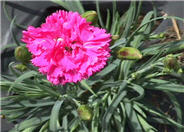
Common name:Carnation, Clove Pink, Pinks
Botanical name:Dianthus caryophyllus
Dianthus caryophyllus is a perennial. It produces double flowers, bluish green leaves, and leafy stems that often become woody at the base.
| Designer: Sunset | Colorful Entry |
Photographer: GardenSoft |
Soils and Compost:
Physical weed control, including mulching, or hand removal protects the watershed from harmful chemicals.
Water Saving Tip:
Water-wise plants can be beautiful as well as practical.
Take your 'My List' Hydrozone Report to a landscape designer, or local nursery, when selecting and purchasing plants.
Integrated Pest Management:
Attract, or buy beneficial insects such as ladybugs and lacewings to control pest outbreaks in your garden.
